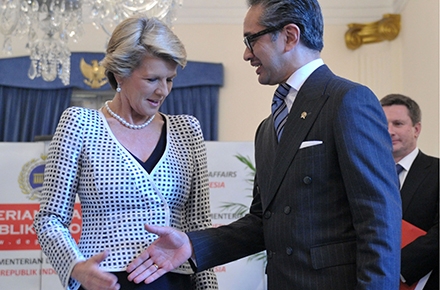A sweet solution to beef, boats and spies woes
A security forum may be the way to build bridges with our northern neighbours, writes John Blaxland.
Australia's bilateral ties with Indonesia and parts of Southeast Asia have taken a battering in recent weeks and months with the poor handling of the live cattle export industry, the megaphone diplomacy on how to ''stop the boats'' and the gravely damaging revelations of apparent eavesdropping on senior Indonesia officials.
But, for the sake of all, the ties need to be restored fully then expanded further. With regional security concerns affecting Indonesia and its contiguous countries, a sub-regional geographic grouping can facilitate enhanced regional security co-operation.
The damaging revelations of apparent eavesdropping on senior officials has resulted in Australia suffering a severe blow to its vital relationship with Indonesia. It is the second such blow since Australia led the intervention force in East Timor in 1999, a move reluctantly endorsed at the time by former president BJ Habibie, but which deeply upset resentful Indonesians and fed phobias about Australia's apparent untrustworthiness.
It took the trauma of the Bali bombings, the Jakarta bombings and the Indian Ocean tsunami early last decade to rebuild bilateral ties - an effort that culminated in the signing of the Lombok Treaty in 2006. These ties were rebuilt through a concerted effort by Australian government agencies and a wide range of non-government organisations engaged in Indonesia and supported by Australia.
Yet Australia (with a little help from Edward Snowden and his friends) has managed to undermine much good work from that period. The trifecta of beef, boats and spies has not quite sunk the relationship, but the bilge pumps are having to work overtime.
Despite the growing importance of Indonesia, there is little public awareness or understanding of the importance of the relationship or how little leverage Australia has over burgeoning Indonesia.
Australia has established ties with Malaysia and Singapore as well as New Zealand and Britain through the Five Power Defence Arrangements - set up when Indonesia was seen, albeit remotely, as a potential threat. Nowadays, the FPDA is an institutionalised and toothy security arrangement that has lived within ASEAN for 40 years and adapted over time.
No longer does Malaysia or Singapore have cause for deep concerns about Indonesia's intentions. Not surprisingly, therefore, while the purpose and nature of the FPDA has evolved, Indonesia is not interested in joining.
For Australia there is enduring utility in maintaining the FPDA arrangements as they provide an excellent forum for multilateral security engagement that can help bolster regional security and stability. Australian Defence Force personnel also gain considerable benefit from training opportunities in Malaysia and Singapore and all participants benefit from the networking and the cross-cultural exposure that helps build mutual understanding and enhances the regional security ''fabric''.
As the countries of Southeast Asia think about security co-operation, Indonesia will be key. So far, Australia has maintained separate lines of engagement with Indonesia. It is clear it will not be part of anything that has traceable links to FPDA. It prides itself over its population and geo-strategic significance, standing astride the maritime arteries connecting the Indian and Pacific oceans, and it has a legitimate aversion to formal defence ties.
From Australia's perspective, there is a growing need to work with Indonesia with empathy and understanding to formulate a new arrangement to address concerns more comprehensively, enabling the co-ordination of efforts with those undertaken alongside Malaysia and Singapore as well.
Beyond the Lombok Treaty and the FPDA, however, one way to facilitate the desired co-operation across these contiguous countries would be to formulate a security arrangement, or security co-operation forum, that includes most of , if not all, those in the FPDA and signatories to Lombok.
Manis is the Indonesian word for sweet. It also could be an acronym for key archipelagic security partners, namely Malaysia, Australia, New Zealand, Indonesia and Singapore. A MANIS regional security co-operation forum, for instance, would not make redundant the FPDA or the Lombok Treaty.
Instead it could have overlapping areas of interest and engagement. There would be scope for other ASEAN countries and East Timor to participate as well, recognising that participation would have to be open-ended.
Such a forum may offer an acceptable way through for Australia and Indonesia to reach beyond the current challenges and assist in managing harmoniously the security challenges of today and into the future.
As the Abbott government seeks to recover from stumbles and puts emphasis on ''more Jakarta and less Geneva'', Australia could approach its important neighbours to explore such a proposal.
With a growing range of security matters of mutual concern, and with constraints evident in the ability of other regional forums to address security concerns in a timely and concrete manner, Australia should meekly and respectfully seek to engage Indonesia as well as Malaysia and Singapore on this concept.
Having done so, Australia could invite them and other interested regional security partners to consider joining hands to develop and implement this proposal for the mutual benefit of all concerned.
Dr John Blaxland is a senior fellow at the Strategic and Defence Studies Centre at the ANU College of Asia and the Pacific. His latest book, The Australian Army From Whitlam to Howard, published by Cambridge University Press, discusses the merits and pitfalls of Australia's military engagement in Southeast Asia. An earlier version of this article appeared in The Jakarta Post on November 19 and this article was first published in The Canberra Times.







